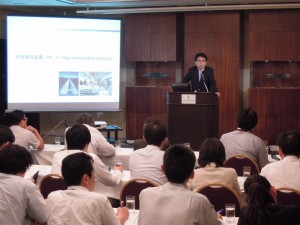A week after the CERN’s announcement of the discovery of the Higgs-like particle, Japan Policy Council (JPC) issued recommendations entitled Creation of Global Cities by hosting the International Linear Collider. Now the English version is available online.
Composed of members who are Japan’s foremost leaders in various fields such as policy making, economics, labour or sociology, the JPC aims to formulate a grand design for Japan for the next decade and to develop a strategy towards its realisation. Concerning Japan’s loss of social vitality due to the declining birthrate and aging population, JPC issues its recommendations to revitalise the country and to reform it to create a “New Japan.” JPC’s recommendation, written from the point of view of the general public, will be disseminated to Japan’s key personalities to spark the national debate over the proposed issues.
The recommendations consist of the following two articles:
Recommendation 1: Japan should transform a regional city into a global city that attracts talent and investment from around the world; the growth of the nation should be led by local leadership.
Recommendation 2: Build a role model for the creation of a global city by reforming a local city through founding an international organisation for the International Linear Collider (ILC), for which Japan is the most probable host.
“On writing up the recommendations, we took particular note on the anticipation that the ILC site will turn into a city which attracts highly intellectual people from around the world, who are devoted to state-of-the-art research activities. The global city will be created in Japan only if the ILC is realised here. This is a chance of lifetime,” said Hiroya Masuda, the chair of the JPC and former Minister of Public Management, Home Affairs, Posts and Telecommunications. “We would like to build the ILC in Japan. That will be a first step to create a global city,” Masuda said.
The key word of this recommendation is “Domestic Globalisation.” The idea is that Japan should revitalise its provincial cities to revitalise Japan itself, with a global viewpoint. If the ILC were built in Japan, it is most likely constructed in a rural area, where new global city will then emerge. “Japan’s central and local governments are now inactive in lack of future strategy. We should take advantage of the opportunity of country’s possible bid to host the ILC,” Masuda said.
The recommendations are based on numerous lessons learned from previous projects in Japan. One of the examples was Tsukuba Science City, the city where the KEK laboratory and its KEKB accelerator is located. Masuda says that Tsukuba failed to develop from a city into a place where people wished to live during the urban development process. The recommendation states “the biggest cause is the lack in the resident point of view.” For the ILC city, it states “It is important to not only to realize international facilities and organizations, but also to design a city that caters to different lifestyles of different countries to allow foreigners to spend their everyday life at ease, which eventually leads to improved quality of life for the local residents”.
Now Tsukuba Science City is gradually becoming the city of increasing population, with infrastructures such as the Tsukuba Express that connects Tsukuba and Akihabara, Tokyo in 45 minutes. The image of a highly educated environment also attracts people as a favourable place to raise their children. But it took almost half a century for Tsukuba to become such a city – this should be avoided for the ILC.
The recommendations received a great response. “I received numerous positive comments from key figures including the top of the economic circle, politicians keen on the science and technology policy, and local governments. They all expressed their backups on the project and many of them said Japan should promote it as one of the national policies,” Masuda said.
Masuda expects that the science community will reinforce their activity by explaining the value of the research to be done at the ILC with lay language. “We were pretty lucky to have CERN’s announcement right before the release of our recommendations,” said Masuda. The level of recognisability of the ILC in Japan is not so high yet. But thanks to the attention given to the discovery of the Higgs-like particle, the significance of the next-generation accelerator following the Large Hadron Collider was easier to explain.
“Still, we need additional effort to gain more public understanding. I expect the world’s scientists to put out the message what and why you want to explore, and how the research at ILC will benefit human beings at large, hopefully in an easy-to-understand way.”


Recent Comments